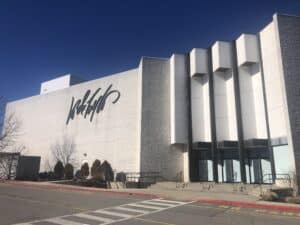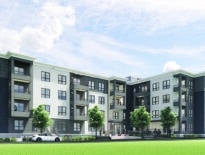
Major changes continue to reshape the Burlington Mall, including a planned conversion of the 125,000-square-foot former Lord & Taylor anchor store into office space. Now a study recommends making it easier to build multifamily housing in a 570-acre district including the mall property. Photo by Steve Adams | Banker & Tradesman Staff
Burlington’s commercial real estate has gone through dramatic change in recent years, including conversions of office buildings into biotech research labs and a pending office project at the Burlington Mall’s former Lord & Taylor anchor store.
Multifamily housing could be the next wave of redevelopment. Officials contemplate rezoning nearly 600 acres including the Burlington Mall with the goal of creating a “15-minute neighborhood” with housing, workplaces and retail in new mixed-use developments.
The changes could catalyze 4.4 million square feet of new development including 1,815 housing units, according to an analysis by consultants hired by the town. And zoning 50 acres for multifamily housing by-right would help the town comply with the MBTA Communities zoning reform law.
“It’s the path to keeping the area active and relevant,” said Scott Weiss, vice president of development at Burlington-based developer Gutierrez Cos. “And it will help further amenitize the workplaces throughout the area. The ideas they presented are pretty well-thought-out, and the market will end up dictating some variations on that.”
Flexible Zoning Proposed
The August 2022 study by Madden Planning Group, Landwise Advisors and Gamble Assoc. analyzed the commercial district stretching from Route 3 to Cambridge Street, including Burlington Mall Road.
Its recommendations – which could come up for a town meeting vote in September – would encourage mixed-use development. The district currently has 8.4 million square feet of commercial development, including 5.1 million square feet of office space.
Flexible, form-based zoning that allows multifamily housing, shopping venues and workplaces would replace the current regulations, most of which haven’t been updated in over 40 years.
Multifamily housing isn’t currently approved under current zoning, although some developers such as The Davis Cos. and Nordblom Co. have built apartment complexes in Burlington office parks through other approval processes in recent years.
And National Development updated The District, a 49-acre office park bordering the mall property that it bought in 2013, adding six restaurants and a hotel.
The town planning study would apply the mixed-use model throughout the 570-acre district.
Andrew Gallinaro, a partner at National Development, said Burlington has consistently led Boston suburbs in its “thoughtful planning approach.” In 2021, Burlington doubled the allowable density in a 150-acre commercial zone just south of Route 128, and made lab development easier to permit.
“Lowering the barriers to entry in forming new housing, and continuing to attract new economy tech and life science companies, is what the town should be doing,” Gallinaro said.

Burlington officials hope to encourage up to 4.4 million square feet of new development and a new series of connections between properties in and around the Burlington Mall. Image courtesy of Madden Planning Group, Landwise Advisors and Gamble Assoc.
Changes Could Be Coming to Simon Malls
As Simon Property Group seeks to diversify its Massachusetts properties beyond traditional shopping malls, the Burlington Mall could become the next test case.
In January, Barnstable officials rezoned Simon’s 65-acre Cape Cod Mall property to allow multifamily housing, hotels and office space.
In Braintree, Simon has agreed to sell a portion of the South Shore Plaza parking lot to Zom Living, a Florida developer that is seeking to rezone the property for a two-building, 495-unit apartment complex. The proposal has already stirred up opposition from neighbors and some town officials, including Mayor Charles Kokoros.
Melisa Tintocalis, Burlington’s economic development director, said town officials are taking a big-picture look at the commercial district.
“A lot of people have brought up the South Shore Plaza,” she said, alluding to the opposition in Braintree. “The difference is ours is a community-driven process. We’re trying to put out what the community wants, rather than it being developer-driven.”
Tim Fox, Simon Property Group’s director of development, did not return messages seeking comment.
The consultants’ report breaks up the area into six subdistricts, reflecting the nature of existing uses ranging from the Leahy Hospital and Medical Center campus to single-use office parks on Van de Graaff Drive and Burlington Woods Drive. But final recommendations on housing development sites are yet to be determined, Tintocalis said.
Lab Demand Drives Recent Activity
Commercial real estate executives say Burlington remains one of the most desirable suburban Boston submarkets emerging from the COVID-19 era. Beyond the mall, large retail properties including Wayside Commons and 3rd Avenue bookend the district, providing an amenity base for office and life science tenants.

Steve Adams
“In the near term, just based upon the capital markets, it will be easiest to do multifamily development, and there’s obviously an opportunity for that,” said Matt Daniels, New England brokerage lead for JLL.
Burlington’s office market has a 17 percent vacancy rate with average asking rents of $41.42 on a full-service gross basis, versus 10 percent and $66.04 per foot on a triple-net basis, according to JLL research.
Recent lab conversions have shrunk and stabilized the office market inventory, said Marci Loeber, managing principal of Griffith Properties. After Burlington enacted its Innovation District life science zoning, the firm sold 3 Burlington Woods Drive, a 164,000-square-foot office building, to San Francisco-based GI Partners for a lab conversion in February 2022.
“Burlington realized they were late in the game with labs, and they have been very proactive,” Loeber said. “Everywhere from Needham to Burlington has benefited from all of the life science conversions.”





